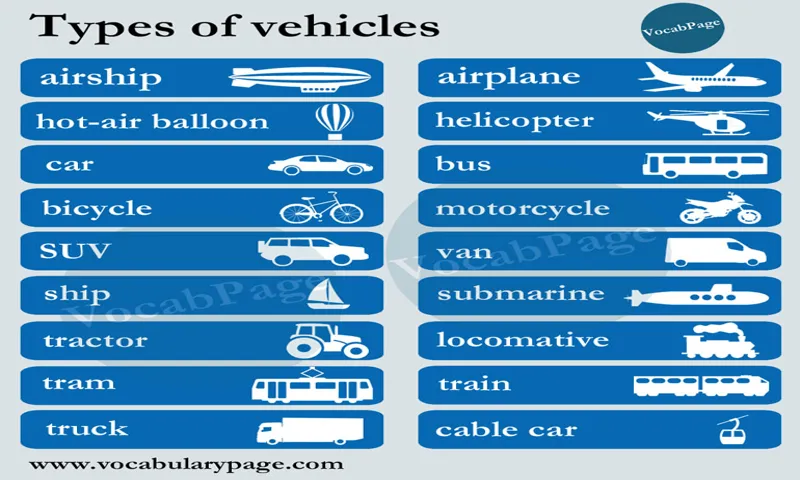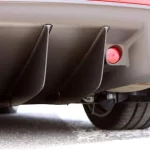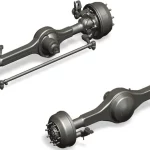Vehicles come in all shapes and sizes, catering to a myriad of needs and preferences. From compact hatchbacks to massive SUVs, each type has its unique characteristics that appeal to different drivers. But with so many options available, it’s easy to feel overwhelmed and confused about which type of vehicle is best for you.
Understanding vehicle types can help you make an informed decision and ensure you get the most out of your purchase. In this blog, we’ll take a closer look at the different types of vehicles, their features, and the benefits they offer. So, whether you’re a city dweller or an off-road enthusiast, get ready to discover the perfect ride for you.
Table of Contents
What is a Vehicle Type?
When we talk about vehicle type, we’re essentially categorizing vehicles based on their purpose or design. It’s more than just the make or model of the car, it’s about what the vehicle is meant to do. For example, SUVs are designed for families who need more space and cargo capacity, while sports cars are designed for speed and performance.
Other types of vehicles include sedans, pickups, vans, and motorcycles. Understanding vehicle types is important because it can help you choose the right vehicle for your needs. If you’re looking for a family car, then an SUV or minivan might be the best choice, but if you’re a commuter who wants something compact and efficient, then a sedan or hybrid might be a better fit.
Regardless of what you’re looking for in a vehicle, knowing the different types can help you make an informed decision.
Definition
A vehicle type refers to the categorization of vehicles based on their intended use, design, capacity, and structural features. This classification system allows us to easily identify and distinguish one type of vehicle from another. For instance, vehicles can be classified as sedans, SUVs, trucks, motorcycles, vans, and so on.
Each vehicle type has unique features that make them suitable for specific applications. Sedans are ideal for daily commuting and family-oriented travel, while SUVs are perfect for off-road adventures. Trucks are useful for hauling heavy loads, while motorcycles offer a thrilling riding experience.
Vans are practical for transporting goods and passengers, especially for businesses. Therefore, understanding vehicle types can help you make informed decisions when choosing the right vehicle for your specific needs.
Examples
A Vehicle Type refers to the classification of a particular vehicle, based on its characteristics and specifications. It helps to understand a vehicle’s purpose and usage, as well as determine licensing and regulatory requirements. For example, a car would be classified as a passenger vehicle, while a truck would be classified as a commercial vehicle.
Other classifications may include motorcycles, buses, and trailers. Understanding a vehicle type is important when it comes to purchasing, insuring, and maintaining a vehicle. When purchasing a vehicle, it’s important to consider the intended use and the type of vehicle that would best suit that purpose.
Insuring a vehicle also requires knowledge of the vehicle type, as different types of vehicles may have different insurance requirements. Additionally, maintaining a vehicle requires knowledge of its unique specifications and requirements, which can be determined by its type. Overall, understanding vehicle types is essential for anyone who uses or interacts with vehicles on a regular basis.
Different Types of Vehicles
When it comes to vehicles, there are various types to choose from. Cars, trucks, buses, motorcycles, bicycles, boats, and airplanes are some of the most common ones. Cars are typically used for personal transportation, while trucks are used for transporting goods.
Buses are for mass transportation of people, while motorcycles are for solo riders. Bicycles come in many shapes and sizes and are popular among fitness enthusiasts. Boats are used for navigating on water bodies, while airplanes are perfect for long-distance travel.
Each vehicle type serves a unique purpose and has its own set of advantages and disadvantages. Whatever your transportation needs may be, there’s a vehicle type that’s perfect for you.
Passenger Cars
Passenger Cars Passenger cars are an essential part of everyday life, providing us with the flexibility to travel and explore at our leisure. But did you know that there are many different types of passenger cars available on the market today? From the practical and compact hatchback to the luxurious and spacious sedan, the choices are endless. The hatchback is an excellent choice for those looking for a versatile and efficient car that can handle everyday use, while the sedan offers more comfort and luxury to those who value style and elegance.
For those who love going off-road or have a passion for outdoor adventures, the SUV and crossover are perfect for their needs, with their all-terrain capabilities and spacious interiors. Additionally, electric cars are gaining popularity due to their eco-friendliness and fuel efficiency. With their silent and smooth ride, electric cars offer a different driving experience than conventional gas-powered vehicles.
In conclusion, the various types of passenger cars cater to different preferences and needs, so it is essential to consider what features and qualities are most important to you before deciding which vehicle to buy.
Trucks
Trucks have come a long way from just being used for hauling goods and cargo. These days, there are many different types of trucks available that have different purposes. For instance, there are pickup trucks that are perfect for everyday use and can be used for everything from hauling furniture to carrying groceries.
Then there are semis that are used for long hauls and transporting large amounts of goods. There are also dump trucks that are used for construction projects and can carry large amounts of debris. Additionally, there are tow trucks that can be used to haul other vehicles.
Each of these trucks has its own unique features and benefits, making them ideal for their respective uses. One of the most versatile and widely used types of trucks is the pickup truck. These vehicles are perfect for people who need a vehicle that can carry bulky items.
They have large beds that can be used to transport furniture, appliances, or even large equipment. And because they are smaller than most other types of trucks, they are easier to maneuver and park in tight spaces. They are also great for off-road driving and can be equipped with four-wheel drive for added traction and control.
On the other hand, semis are designed for long-haul and transporting large amounts of goods. They typically have a cab that is separate from the trailer, which makes it easier to maneuver around tight corners and obstacles. These trucks are also designed with powerful engines that can handle the weight of the cargo, making them a popular choice for commercial freight transportation.
Dump trucks, on the other hand, are designed for construction projects and can carry large amounts of debris. They have a hydraulic system that allows the bed to be lifted and dumped, making it easy to unload dirt, gravel, and other materials. They are also designed with sturdy frames and powerful engines that enable them to carry heavy loads.
Vans
Vans are a popular choice for people who need a vehicle that can transport goods or passengers. There are several types of vans available on the market, each with its own unique features and advantages. One of the most common types of vans is the cargo van, which is designed to carry goods and materials.
Cargo vans come in various sizes, from compact models to larger ones that can accommodate heavier loads. Another type of van is the passenger van, which is ideal for transporting people. Passenger vans usually have multiple rows of seats, making them suitable for large families or groups.
Some vans are also designed specifically for commercial use. For example, refrigerated vans are used to transport perishable goods, while utility vans are often used by tradespeople and contractors to carry tools and equipment. Overall, vans provide a versatile and practical option for anyone in need of a vehicle to transport goods or people.
SUVs and Crossovers
SUVs and crossovers are both popular types of vehicles that offer unique benefits and features. SUVs are typically larger and can hold more passengers and cargo, while crossovers are often smaller and have a more car-like feel. SUVs are also known for their off-road capabilities and towing ability.
Crossovers, on the other hand, are known for their fuel efficiency and maneuverability. Both types of vehicles have their own advantages and disadvantages, and it ultimately depends on individual needs and preferences. If you need a vehicle that can handle tough terrain or tow heavy loads, an SUV may be the way to go.
However, if you prioritize fuel efficiency and a comfortable ride, a crossover might be the better option. Whatever your choice, both SUVs and crossovers are great options for those who need a versatile and reliable vehicle.
Vehicle Type vs. Vehicle Class
“What is Vehicle Type”: Understanding the Difference between Vehicle Type and Vehicle Class When it comes to buying a vehicle, it’s important to understand the differences between vehicle type and vehicle class. Vehicle type refers to the fundamental design and purpose of a vehicle. Examples of vehicle types include sedans, SUVs, trucks, and vans.
On the other hand, vehicle class refers to the size and price range of a vehicle. Examples of vehicle classes include compact, mid-size, and full-size. Understanding the difference between these terms is important because they can affect a vehicle’s functionality, safety, and maintenance costs.
It’s also worth noting that some vehicle types can fall into multiple vehicle classes. For instance, an SUV could belong to a mid-size or full-size vehicle class depending on its size and price range. Ultimately, choosing the right vehicle type and class depends on your needs and preferences.
Explanation
When it comes to vehicles, many people use the terms “vehicle type” and “vehicle class” interchangeably. However, they actually refer to two different things. Vehicle type refers to the general category of a vehicle, such as sedan, SUV, or truck.
On the other hand, vehicle class is a more specific categorization, based on factors such as size, features, and price. For example, within the SUV vehicle type, there are different classes such as compact, mid-size, and full-size SUVs. Understanding the difference between vehicle type and vehicle class can help you narrow down your options when shopping for a new car.
It’s important to note that different countries may use different terms or categorizations for vehicles, so it’s always a good idea to do your research before making a purchase.
Examples
When it comes to vehicles, the terms “vehicle type” and “vehicle class” are often used interchangeably, but they actually refer to different things. Vehicle type refers to the general category of vehicle, such as sedan, SUV, or truck, while vehicle class refers to the size and features of a vehicle. For example, a sedan could be classified as a compact, midsize, or full-size vehicle, depending on its dimensions and amenities.
Understanding vehicle types and classes is important when shopping for a vehicle, as it can help you narrow down your options based on your needs and preferences. For instance, if you need a vehicle with ample cargo space, you might focus on SUVs or minivans, as these are generally classified as larger vehicles with roomier interiors. On the other hand, if fuel efficiency is a priority, you might look for a smaller vehicle in the compact or subcompact class.
It’s also worth noting that the distinctions between vehicle types and classes can vary depending on the country and manufacturer. In some regions, a particular vehicle might be classified differently than it would be elsewhere. That’s why it’s important to do your research and not rely solely on labels when looking for a vehicle that meets your specific needs.
Conclusion
In essence, a vehicle type is a classification system that helps us categorize the multitude of modes of transportation that exist in our world today. From cars to planes, bikes to boats, these designations provide us with a clear framework for understanding the unique characteristics and qualities that make each vehicle type one-of-a-kind. So the next time you’re discussing your favorite mode of transportation, you can impress your friends with your knowledge of its official vehicle type – or just continue to enjoy the ride, knowing that your mode of transport is truly a one in a million!”
FAQs
1. What are the different types of vehicles? A: The different types of vehicles include cars, trucks, buses, vans, motorcycles, bicycles, boats, and airplanes. 2. How are vehicles classified according to their purpose? A: Vehicles can be classified according to their purpose as personal vehicles, public transportation vehicles, emergency vehicles, and commercial vehicles. 3. What are the different types of cars? A: The different types of cars include sedans, coupes, convertibles, hatchbacks, SUVs, and sports cars. 4. What are the different types of trucks? A: The different types of trucks include pickup trucks, tow trucks, dump trucks, box trucks, and tractor-trailers. 5. What are the different types of buses? A: The different types of buses include school buses, city buses, tour buses, and shuttle buses. 6. What are the different types of motorcycles? A: The different types of motorcycles include cruisers, sports bikes, touring bikes, dirt bikes, and dual-sport bikes. 7. What are the different types of boats? A: The different types of boats include motorboats, sailboats, fishing boats, bass boats, and personal watercraft.



